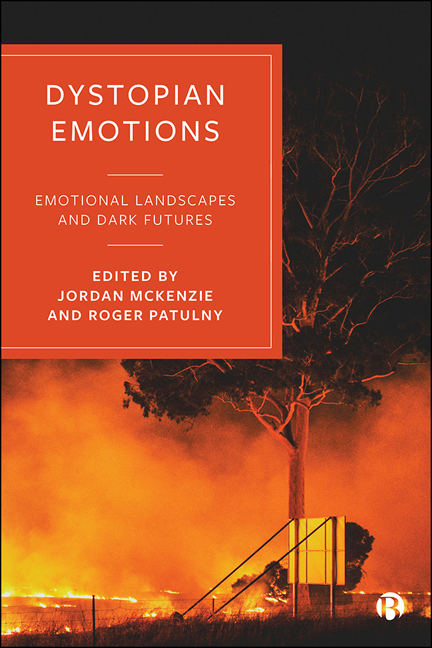Book contents
- Frontmatter
- Contents
- Notes on Contributors
- Acknowledgements
- Introduction: The Feeling of Dystopia
- 1 Borderland Emotions: A Case Study of Youths in Kinmen, Taiwan
- 2 Beyond Wicked Facebook: A Vital Materialism Perspective
- 3 Detangling Online Dystopias: Emotional Reflexivity and Cyber-Deviance
- 4 Mass Emotional Events: Rethinking Emotional Contagions after COVID-19
- 5 Between the Nationalists and the Fundamentalists, Still We Have Hope!
- 6 ‘The New Economy and the Privilege of Feeling’: Towards a Theory of Emotional Structuration
- 7 Neo-Villeiny University
- 8 Resuscitating the Past: Zygmunt Bauman’s Critical Analysis of the Recent Rise of Retrotopia
- 9 Hope Out of Stock: Critical and Melancholic Hope in Climate Fiction
- Conclusion: A Critical Mass of Emotions – Reflexivity, Loneliness and Hope?
- Index
9 - Hope Out of Stock: Critical and Melancholic Hope in Climate Fiction
Published online by Cambridge University Press: 13 May 2022
- Frontmatter
- Contents
- Notes on Contributors
- Acknowledgements
- Introduction: The Feeling of Dystopia
- 1 Borderland Emotions: A Case Study of Youths in Kinmen, Taiwan
- 2 Beyond Wicked Facebook: A Vital Materialism Perspective
- 3 Detangling Online Dystopias: Emotional Reflexivity and Cyber-Deviance
- 4 Mass Emotional Events: Rethinking Emotional Contagions after COVID-19
- 5 Between the Nationalists and the Fundamentalists, Still We Have Hope!
- 6 ‘The New Economy and the Privilege of Feeling’: Towards a Theory of Emotional Structuration
- 7 Neo-Villeiny University
- 8 Resuscitating the Past: Zygmunt Bauman’s Critical Analysis of the Recent Rise of Retrotopia
- 9 Hope Out of Stock: Critical and Melancholic Hope in Climate Fiction
- Conclusion: A Critical Mass of Emotions – Reflexivity, Loneliness and Hope?
- Index
Summary
Emotionally loaded futurity: hope and despair in/action
Hope is a temporally complex emotion. It is cultivated in the present, yet its object is some future outcome. Defined by Lazarus (1999) both as an emotion and a coping strategy, hope mobilizes around desire but includes an assessment of realistic future possibilities. Hope is heralded as giving human lives meaning, motivating action, utopian thinking and even, in some hopeful formulations, as an emotion that makes the future possible by protecting us from its debilitating opposite, despair (Bloch and Plaice, 1986; Lazarus, 1999; Van Hooft, 2014). Van Hooft (2014) writes that hope requires both belief in possible fulfillment and anxiety over the chance this will not occur. Predicated on fear of being thwarted, hope is therefore ‘our existential response to the contingency that is a mark of all our actions and of the world we live in’ (Van Hooft, 2014, p. 32).
Presently, hope is also the catch cry of diverse cultural moments and discourses: Barack Obama's 2008 electoral campaign. The positive thinking sloganeering of popular psychology. The blurbs of countless book club novels and Hollywood films. Against the backdrop of a 24-hour news cycle featuring climate crisis, police brutality, violence against women, devastating poverty, inequality and global pandemic it's unsurprising that we crave narratives anchored in hope. But is hope more likely to mollify or motivate? In the case of our ability to imagine and come to terms with future scenarios predicted by climate science, are narratives that prioritize hope important to or compatible with the work of acceptance, grief and adaptation?
In some conceptions, such as those offered by Bloch and Plaice (1986) hope is necessarily distinct from wishing or optimism. In their readings of Bloch, Moylan and Levitas point to the centrality of ‘educated hope’ for utopian projects that move beyond wishful thinking into ‘will full thinking’ thereby working towards better possible worlds (Levitas, 1990, p. 15; Moylan, 2014). Further, as Browne (2005, p. 75) observes, because ‘the capitalist imaginary has proven a powerful definer and distributor of hope. Hope is therefore far from an intrinsically critical category, it should be viewed instead as an orientation that animates critique’.
- Type
- Chapter
- Information
- Dystopian EmotionsEmotional Landscapes and Dark Futures, pp. 159 - 175Publisher: Bristol University PressPrint publication year: 2021



